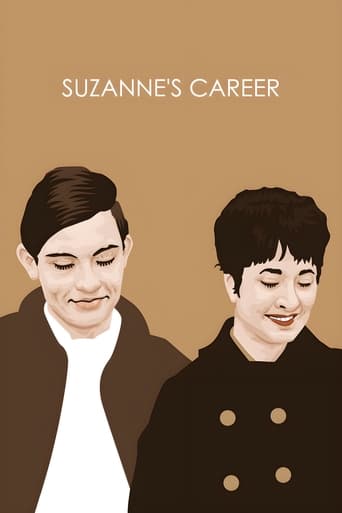MartinHafer
"Suzanne's Career" is a rather slow moving story about three friends. One is a bit of a Romeo and is focused on his current conquest, Suzanne. The other is a friend who narrates the film. His role is odd--he just hangs around the two and acts a bit like a chaperon--a chaperon who disappears when the pair want to sleep together. Eventually, the simple girl, Suzanne, turns out to be a bit more clever than either guy had expected and soon begins to make eyes at the chaperon. What is going on here? See the film yourself if you'd like to know.Watching "Suzanne's Career" reminds me of a home movie--a very good home movie, but a home movie nonetheless. It appears to have been made using an 8mm camera, is quite grainy, have occasionally sloppy edits and has no titles or introduction. The camera also appears to have been hand-held at times and is, occasionally, a bit jerky. Because of all these factors and the non-professional style of the acting, it's not very easy to take this film seriously. The way I see it, it's a way for Eric Rohmer fans to see his early works in order to see how much he improved and evolved over the next few decades. And because of all this, it's NOT a movie for the casual viewer--more for the die-hard Rohmer fans. And, because I assume this was only made for Rohmer and his New Wave buddies, I really don't think it's possible to score this one.By the way, twice in the film the line "Girls like to be forced" was repeated. How very progressive!!
nycritic
Part two of Eric Rohmer's ongoing series of stories, this one concerns a love triangle of sorts. Bertrand and Guillaume meet Suzanne, a young, plain-looking woman. Bertrand decides not to pursue her, but Guillaume does, and once he's made her his, he pushes her aside. Angered, Suzanne flirts with Bertrand and asks him out in order to make Guillaume jealous. What takes place is a series of events in which both young men take advantage of Suzanne who is somewhat of a mousy character throughout part of Rohmer's plot, but who takes charge in the short movie's later half. SUZANNE'S CAREER also concerns a constant in Rohmer's "Six Moral Tales" theme: the man who is attracted to a woman he does not want, and idealizes another woman he does want (or already is engaged/married to). Normally the spurned woman is not to the type of the protagonist's liking, and the one he is in love with, is. Sophie, in this story, represents that ideal for Bertrand even when to the viewer she appears rather dull and Suzanne has shown a greater personality than originally displayed. Not as talky as LE GENOU DE CLAIRE (indeed, no movie can be!) this one has a little more wit to it, even when it's a little flat here and there.
Howard Schumann
In Suzanne's Career, the 54-minute second film of Rohmer's group of Six Moral Tales, two friends, both students at a local university, vie for the affections of Suzanne (Catherine See). Guillame (Christian Charriere) is the more aggressive and the most manipulative but Bertrand (Phillipe Beuzen) goes along with his schemes and his character is not beyond blemish. Both scheme to have Suzanne pay for their good times and ignore her at parties to make her jealous while telling each other how they detest her.There is a great deal of narration in the film and we are privy to Bertrand's thoughts and feelings as he sorts out for himself what is right and what is wrong. Suzanne is sweet but seemingly rather passive and easily exploited and we root for her to assert herself, and in typical Rohmer style we don't have to wait very long. This is a lovely film and, though it goes on a bit too long in pursuing its resolution, the ending is deliciously satisfying.
ieaun
This film by Eric Rohmer shows that the style for which he has become famous was developed at an early stage - a concentration on the relationships between young people performed by unknown actors in an almost documentary style. As usual with Rohmer the performances of the actors are variable and not much happens in terms of plot. Instead the film concentrates on the emotional development of its young subjects, with the central character a little wiser by the end. The scenes on central Paris in the early sixties mean that part of the film's appeal is as an historical document in the same way as Chabrol's "Les Bonnes Femmes" and Varda's "Cleo De 5 a 7".
